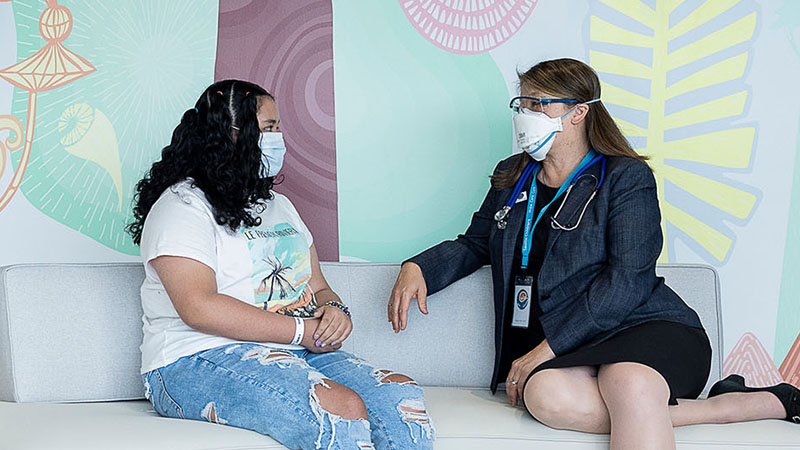Von Willebrand Disease
What is von Willebrand disease?
Von Willebrand disease is a bleeding disorder. It can cause bleeding problems because blood does not clot well after an injury.
Normally, pieces of blood cells (platelets) clump together after an injury. This helps form a clot and stops bleeding. A protein called von Willebrand factor helps blood clot. In von Willebrand disease, there is not enough of this protein or the protein does not work right.
-
Types of von Willebrand disease
Type 1: Von Willebrand factor is fairly normal, but there is not enough of it. Children with this type may also be low on another clotting factor, called factor VIII (factor 8). This is the most common type of the disease. It tends to be mild.
Type 2: Von Willebrand factor is abnormal. There are several kinds of type 2 von Willebrand disease. Some are more severe than others.
Type 3: There is little or no von Willebrand factor. Often a child with this disease type also has low levels of factor VIII. This type of von Willebrand disease is the most serious. It is very rare.
-
What causes von Willebrand disease?
Von Willebrand disease is caused by a change (mutation) in a gene that makes von Willebrand factor.
The abnormal gene is passed down from a mother or father or both parents.
Usually, children who get the gene from just 1 parent will have type 1 or type 2 disease. They may have no symptoms or mild symptoms. But sometimes their symptoms are very serious. Even within a family, some people may have more problems with their disease than others.
Children who get the gene from both parents are likely to have more severe disease.
Cancer and Blood Disorder Care at Seattle Children's
Symptoms of Von Willebrand Disease
Signs and symptoms of von Willebrand disease can be mild or serious. It depends on which type of the disease your child has.
- If your child's disease is mild, you may not notice any sign of bleeding problems until a serious injury or surgery. Most children have a mild type.
- If your child's disease is severe, you will likely notice symptoms of bleeding problems early, even as a baby.
Symptoms may include:
- Nosebleeds that happen often and last longer than normal
- Easy bruising
- Bleeding that lasts longer than normal, for example, after a cut, a tooth is pulled or surgery
- For girls, heavy menstrual periods
Too much bleeding can be dangerous. But even if your child has a severe type of von Willebrand disease, treatment can help prevent serious problems.
Diagnosing Von Willebrand Disease
If your child seems to have a bleeding problem, your child’s doctor will ask questions to find out about:
- Bleeding that happens for no clear reason
- Bleeding from a minor injury that lasts a long time
- Bleeding that stops for a while but starts again
Your child’s doctor will also check for other signs of bleeding problems and other health issues that can affect bleeding. The doctor will order blood tests to learn:
- How much von Willebrand clotting factor your child has
- Whether your child’s von Willebrand factor is normal and how well it works
- How well your child’s blood clots, such as checking levels of other clotting factors
- How many platelets your child has and how well they are working
-
Genetic testing
Sometimes it can be tricky to diagnose the disease, especially in mild cases. When a child is diagnosed with von Willebrand disease, we usually consider testing other family members who might have it. Testing parents may help us better understand a child’s risk of bleeding.
We often refer parents to the Washington Center for Bleeding Disorders at Bloodworks Northwest. They can assess you and your chance of passing von Willebrand disease to children in future pregnancies.
Treating Von Willebrand Disease
Your child may not need any treatment for von Willebrand disease unless they have problems with bleeding too much.
If your child needs medicine or clotting factor into their vein (infusion), they can get care without having to spend a night in the hospital.
- Our outpatient infusion unit is staffed by expert nurses and is open every day.
- Sometimes we teach families to mix and give infusions at home. This may be done with a butterfly needle or an intravenous (IV) line that we place before a child goes home.
-
Medicine to improve clotting
To prevent bleeding: A medicine called desmopressin (brand name Stimate) helps increase clotting. Doctors can give it to your child before any planned surgery or dental work. This medicine can be taken as a nose spray or into a vein (IV).
Desmopressin does not work well for all children. Your doctor may give your child a test dose to see if it increases their levels of von Willebrand factor enough. We do not use it in children under 3 years old.
To reduce bleeding: Medicines that help keep blood clots from breaking down are called antifibrinolytic (AN-te-fi-BRIN-o-LIT-ik). They are used mainly to reduce bleeding after:
- An injury
- Having a tooth pulled
- Surgery
-
Clotting factor
If your child needs major surgery and does not respond well to medicine that increases clotting, they may need replacement clotting factor. It is given into a vein in your child’s arm.
-
Blood transfusions
If your child has a lot of bleeding because of von Willebrand disease, they made need a blood transfusion.
Transfusing blood means giving red blood cells from a healthy donor. Your child receives the blood through a vein in their arm.
-
Preventing bleeding
We talk with you and your child about ways to prevent excess bleeding. Your child may need to:
- Avoid injury, such as not playing contact sports.
- Reduce bleeding during menstruation. Girls who have very heavy menstrual periods because of von Willebrand disease may want to take hormones or medicine to decrease the buildup of the lining of the uterus. Some girls use the desmopressin nasal spray on the heaviest days of their period to decrease bleeding.
- Avoid medicines that increase bleeding, such as aspirin and ibuprofen (Advil). Your child’s doctor can give you details about which medicines to avoid.
If your child needs surgery or dental work, we create a treatment plan so it can be done safely.
Von Willebrand Disease at Seattle Children’s
The U.S. Centers for Disease Control and Prevention has named Seattle Children's a hemophilia treatment center (HTC). This means we bring together a team of healthcare experts who are experienced in treating children and teens with bleeding disorders like von Willebrand disease and hemophilia. Our goal is to help your child lead an active, normal life.
Seattle Children’s has the only HTC for children and teens in Western Washington. We also serve Alaska, with a full range of services to diagnose and treat this disease.
Our HTC team is part of our Cancer and Blood Disorders Center (CBDC). If you would like an appointment, ask your child’s primary care provider to refer you. If you have a referral or would like a second opinion, contact the center at 206-987-2106.
Providers, see how to refer a patient.
-
The experts you need for complete care
Our doctors are nationally known for treating children who have blood disorders. The doctors who will guide your child’s care are board certified in pediatric hematology-oncology. This means they are approved to give the special care your child needs and they constantly expand their knowledge about blood disorders.
We offer a full range of services to diagnose and treat children with von Willebrand disease. These include medicine, clotting factors and blood transfusions if needed. We also help your child prevent bleeding. We work with your family, your child and your child's primary doctor to get your child the right care and services.
We care for your whole child. We don’t just treat their disease. Our bleeding disorders team also includes nurses, social workers and physical therapists. We partner with Adolescent Gynecology to meet the needs of young women and girls with bleeding disorders. Children with severe disease may receive care from experts in nutrition, pain management and emotional health. Read more about the supportive care we offer.
-
Among the nation’s best children’s hospitals
Our specialty is treating children’s disease while helping them grow up to be healthy and productive.
Our physician-scientists help set national standards for care of young people with blood disorders. We provide the most advanced treatments in our region.
Children do not react to illness, injury, pain and medicine in the same way as adults. They need – and deserve – care designed just for them. We plan your child’s treatment based on years of experience plus the newest research on what works best – and most safely – for children.
-
Support for your whole family
A diagnosis of von Willebrand disease can be stressful. We help take positive steps right away by offering same-day appointments for children with urgent needs. If needs are not urgent, most new patients are seen within 1 or 2 weeks.
During visits, we take time to explain your child’s condition. We help you fully understand your treatment options and make the choices that are right for your family.
Our child life specialists and social workers help your child and your family through the challenges of this condition. We connect you to community resources and support groups.
At Seattle Children's, we work with many children and families from around the Northwest and beyond. Whether you live nearby or far away, we can help with financial counseling, schooling, housing, transportation, interpreter services and spiritual care. Read about our services for patients and families.
Contact Us
If you would like an appointment, ask your child’s primary care provider to refer you.
If you have a referral or would like a second opinion, contact the Cancer and Blood Disorders Center at 206-987-2106 or by email.
Providers, see how to refer a patient.
Related Links
Paying for Care
Learn about paying for care at Seattle Children’s, including insurance coverage, billing and financial assistance.


